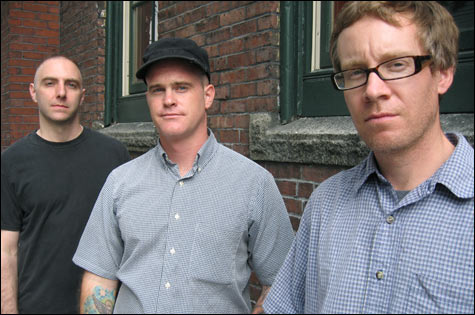
KARATE, CHOPPED: Glorytellers’ understated, folky feel does without extended displays of virtuosity |
There was a time when it was easy to hate Geoff Farina. Well, maybe hate is too strong a word. After all, he’s a nice, polite, well-groomed, thoughtful, generally likable guy. But in the mid ’90s, he took one of this city’s more promising post-Slint indie guitar-rock bands and messed it all up by adding a bunch of jazz-flavored stuff, from minor-ninth chords to long, modal guitar solos. It didn’t help that he’d been to Berklee. And all of this from a singer/guitarist with an otherwise immaculate résumé that included playing in the quiet, indie-folk Secret Stars with Jodi Buonanno and, in the late ’90s, co-founding the Narragansett Grange Hall in Wakefield, Rhode Island — a living/performance space that opened its doors to artists-in-residence like DC punk photographer Pat Graham and violinist Ida Pearl, namesake of the band Ida. Oh, and Geoff’s sister Amy is married to Ian MacKaye.
“So,” I can’t help asking when Farina and I meet at the Sherman Café, near his current home in Union Square, “when you go home for Thanksgiving and Christmas, Ian’s just there?”
“Yeah, yeah, more or less. But I’ve known him for a while. So it’s not that different. And he’s a regular dude. With Glorytellers he’s been super helpful and inspiring.”
Glorytellers, who play upstairs at the Middle East this Friday, are Farina’s new band, and the reason we’re meeting. As a vehicle for his songwriting, the trio delve even deeper into the jazz Farina, drummer Gavin McCarthy, and bassist Jeff Goddard toyed with in Karate — so much so that iTunes has their homonymous Southern debut listed under “jazz.”
Indeed, Glorytellers goes a long way toward making sense of what Farina was reaching for when he first brought jazz into the Karate fold — in part by doing away with the usual guitar/bass/drums rock line-up in favor of fingerpicked acoustic guitar, electric guitar, and drums, with the acoustic as the focus. It’s a natural fit for Farina’s stark, impressionistic lyrics; and the low-key arrangements complement melancholy imagery like the lone rose in the disc’s opener, “Camouflage,” and the “suicide by cigarettes and Maker’s Mark” in “Awake at the Wheel.” Farina can continue to stretch out — displaying his nylon-string-acoustic chops in “Trovato Suono,” for example — without overreaching. If anything, the acoustic gives the album an understated, folky feel while steering the trio away from extended displays of lead-guitar virtuosity. In other words, all is forgiven.
“It was really never Berklee’s influence,” he says of the jazz chordings that crept into Karate. “It’s always just been the influence of the musicians I was listening to. To this day, I learn from listening to musicians who I love, like old-time musicians and jazz and blues. I try to learn that stuff just because I’m curious about it and then I try to incorporate it into what I do. And there was a time when I was listening to a lot of jazz guitar, fooling around with a lot of Jim Hall ideas. I felt there was some fertile territory there.